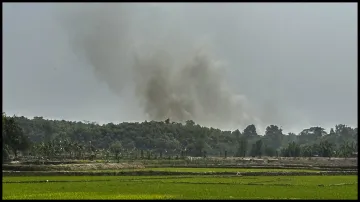India issues advisory for travellers going to Myanmar's Rakhine state amid deteriorating situation
Last week, India had expressed concern over the deteriorating situation in Myanmar on the occasion of the third anniversary of the military establishment. The junta has been locked into an embittered battle with the country's ethnic militia groups since last year.

New Delhi: India's Ministry of External Affairs on Tuesday issued a travel advisory for Indian citizens cautioning them to avoid travelling to Myanmar's Rakhine state as the civil war between ethnic militia groups and the military continues. The MEA asked Indian nationals already in Rakhine State to leave immediately as the situation worsens.
The situation has continued to deteriorate since an alliance of ethnic minority armies launched an offensive against the military government last year. More than 100 members of Myanmar’s Border Guard Police have fled their posts and taken shelter in Bangladesh to escape fighting, according to officials.
"In view of the deteriorating security situation, disruption of means of telecommunications, including landlines, and severe scarcity of essential commodities, all Indian citizens are advised not to travel to the Rakhine State of Myanmar. Those Indian citizens who are already in Rakhine State are advised to leave the State immediately," said the MEA in its travel advisory for Indians.
Last week, New Delhi expressed concern over the "deteriorating" situation in Myanmar and urged for an early resolution to the conflict with the return of peace and stability in the country. The MEA also emphasised that New Delhi has long been advocating for the "complete secession" of violence and Myanmar's transition towards "inclusive federal democracy."
The Three Brotherhood Alliance, an alliance of ethnic militia groups, said in a statement Monday that the Arakan Army had attacked two border outposts in Maungdaw township in Rakhine state and captured one of them on Sunday. Khaing Thukha, an Arakan Army spokesperson, said that fighting continued Monday at the second outpost.
The Arakan Army is the military wing of the Rakhine ethnic minority that seeks autonomy from Myanmar’s central government. It has been attacking army outposts in the western state since November. Two persons — a Bangladeshi woman and a Rohingya refugee— were killed on Monday in shelling from Myanmar after a house in Bandarban was hit, according to Bangladeshi media.
Sanctions on Myanmar's military
Meanwhile, US designated four individuals and two entities linked to Myanmar's military regime. It said that the country's military has continued to carry out a "campaign of violence and repression" against the people of Myanmar.
"We are taking this action to target the regime's sources of revenue, which support military activities against civilians. The action also targets those who provide material and support for the production of arms in Burma (Myanmar)," said US State Department spokesperson Matthew Miller.
The EU High Representative for Foreign Affairs on behalf of the European Union also condemned sexual and gender-based violence and the restriction of fundamental freedoms by the military regime. Australia also imposed additional targeted sanctions on five entities with direct links to the Myanmar military regime to limit the regime's access to the funds and materials that enable it to continue to "commit atrocities against its own people".
Concerns over airstrikes on civilians
Nine members of the United Nations Security Council condemned “indiscriminate” airstrikes by Myanmar’s military against civilians before an envoy briefed the council on Monday to implement a peace plan that has so far been largely ineffective. The plan called for the immediate cessation of violence in the country but has been ignored by the Army that took over power in a coup in 2021.
A fresh uptick was noticed in incidents of violence in Myanmar recently, after three ethnic minority forces launched a coordinated offensive last October, capturing some towns and military posts. The experts called it the 'biggest test' for the junta since taking power in 2021. This also led to a huge influx of people from Myanmar into the state of Mizoram along the Indo-Myanmar border after the Myanmar army launched airstrikes in the bordering areas.
The nine council members — Ecuador, France, Japan, Malta, South Korea, Slovenia, Switzerland, United Kingdom and the United States — said that, three years after the military takeover, more than 18 million people need humanitarian aid and 2.6 million remain displaced.
They expressed increasing concern at the situation in Rakhine state bordering Bangladesh, where more than 1 million Rohingya Muslims fled starting in August 2017, when the military in Buddhist-dominated Myanmar launched a brutal “clearance operation” against them following attacks by the insurgent Arakan Army.
(with inputs from agencies)
ALSO READ | Govt to fence entire 1643-km long Indo-Myanmar border, says Amit Shah